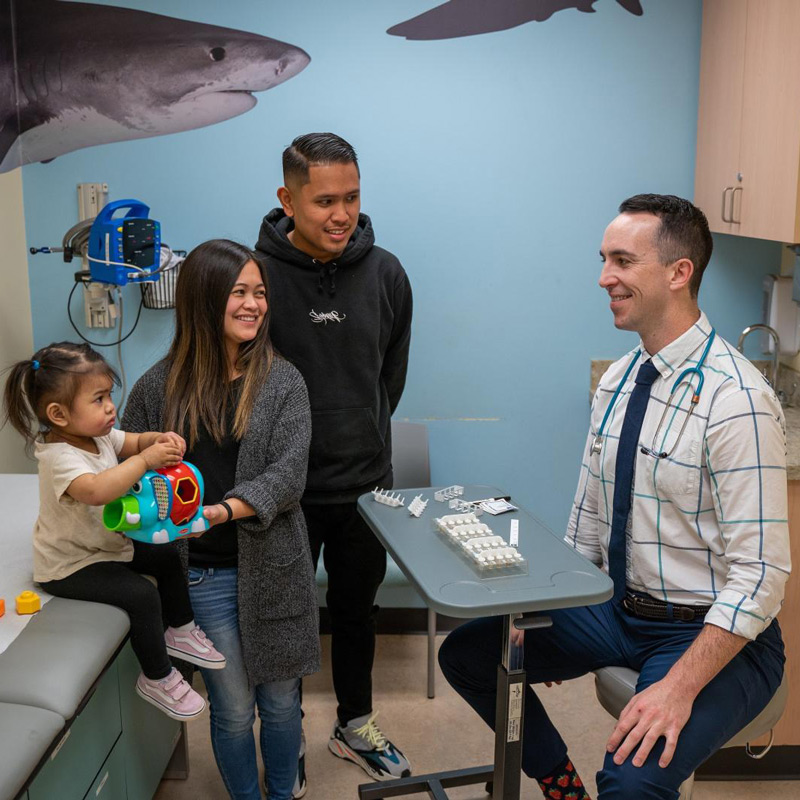One in 13 individuals – or 8.4 percent of the population – has asthma, and severe cases are increasing as more people develop allergies, which commonly trigger asthma.
The new Severe Asthma Clinic, part of the Children’s Pulmonary Institute at MemorialCare Miller Children's & Women’s Hospital Long Beach, provides comprehensive, multi-disciplinary care to infants, children and adolescents struggling with severe asthma. Miller Children’s & Women’s is only one of two hospitals in the state to have this unique program.
“Successfully treating kids with asthma in or outside of intensive care units is best approached comprehensively,” says Vincent Devlin, DO, pediatric allergist, Children’s Pulmonary Institute, Miller Children’s & Women’s. “We want to provide the most effective care to hard-to-treat asthmatics, our sickest patients.”
Potentially life-threatening asthma has the best outcome in patients treated by highly trained multi-disciplinary teams, adds Bugsu Ovunc, M.D., pediatric pulmonologist, Children’s Pulmonary Institute, Miller Children’s & Women’s, who notes that demographic background, environmental factors, and poor living conditions can trigger severe asthma.
The two physicians say parents concerned about their children should watch for symptoms, such as shortness of breath with exertion and note whether their children are able to keep up with their peers when playing or competing in sports. Another common symptom is a chronic cough.
“When examined by a doctor, children will wheeze,” Dr. Ovunc says. “It’s not an audible sound, but we can detect a whistle when they attempt to breathe.”
In addition, she notes, “a cold is never just a cold for these kids. It seems to their parents as if they are always sick.”
“They cough so hard they cannot sleep at night, they throw up, or their oxygen levels drop,” she explains. “They work so hard to breathe that they can’t talk in full sentences, and they’re taken to the hospital emergency room frequently.”
Once a child is brought to the Severe Asthma Clinic, they are evaluated by a team of specialists, Dr. Devlin says. The evaluation includes spirometry (breathing tests), evaluation of medications, and a complete lung examination, as well as identification of possible allergies, including food, environmental and drug allergies.
Tests help rule out other conditions, like reflux or sleep apnea, that can mimic symptoms of asthma.
The Severe Asthma Clinic’s comprehensive, one-stop approach is possible because of the many disciplines represented by its team of medical specialists, he says. In addition to physicians, the team includes but is not limited to pediatric respiratory therapists, clinical pharmacists who specialize in children’s medications, social workers, pediatric nurses, and child life specialists who work with children and their parents to explain procedures and soothe young nerves.
Dr. Ovunc says that the latest state-of-the-art allergy, immunotherapy, and asthma treatments often include new biologic medications that specifically target symptoms without the troublesome side effects often generated by more traditional medicines, such as steroids.
Dr. Devlin believes the Severe Asthma Clinic at Miller Children’s & Women’s provides the region’s most comprehensive asthma care.
“In doing so, we’re keeping kids as healthy as they can be.” Miller Children’s & Women’s is the only free-standing children’s hospital in California, and only one of 13 hospitals in the nation, to receive the Disease Specific Certification in Pediatric Asthma from The Joint Commission. This recertification denotes the highest honor for quality and excellence in patient care for children with asthma.

